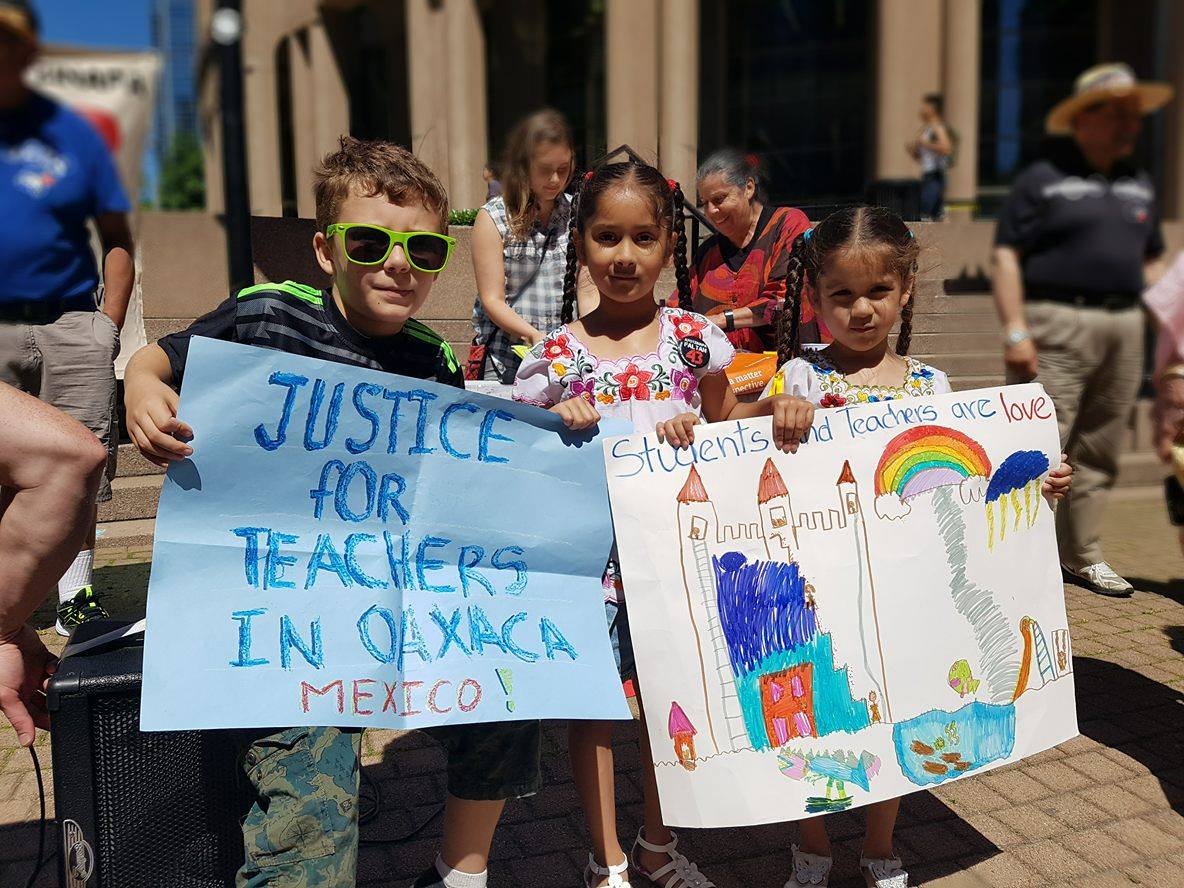Like this article? rabble is reader-supported journalism. Chip in to keep stories like these coming.
Teachers in four Mexican states refused to head back to school on Monday as the teacher-led movement against President Enrique Peña Nieto’s impeding education reform ramps up with ongoing strikes and renewed road blockades.
The CNTE, the dissident faction of the national teachers’ union SNTE, announced yesterday that schools in Oaxaca, Chiapas, Guerrero and Michoacan would remain closed along with 11 schools in Mexico City as CNTE teachers continue to strike. CNTE teachers have been on strike against the reforms since May 15.
The CNTE’s militant Oaxaca section, Section 22, insists that schools should remain closed for the year to protest reforms, and reinstated around 25 road blockades across Oaxaca for two days.
The reforms will effectively privatize the education system, undermine teacher’s unions, and institute state-administered standardized tests to evaluate teacher performance.
A wave of protests swept across the country after security forces killed at least 10 teachers and supporters were killed in Nochixtlan, Oaxaca on June 19.
“I believe that this government does not represent the people, especially not the campesinos and Indigenous people of Oaxaca, they wish to levy more fees and taxes upon working people that can hardly pay to live as it is,” Tigre Rebelde, who did not use their real name, a member of the Oaxaca-based Organizaciones Indias de Derechos Humanos de Oaxaca (OIDHO), told rabble.
OIDHO is an Indigenous grassroots organization that continues to mobilize alongside teachers and students in Mexico.
OIDHO against reforms
OIDHO has “been engaged with local radio [and is] educating local people about the teachers strike and the blockades,” Rebelde told rabble. OIDHO members have been active in some of the blockades, and the group continues to send food packages to striking teachers.
Rebelde explained that OIDHO is demanding “the different levels of government sit down with the striking teachers of section 22 of the CNTE, and that [the government] ceases all violence towards the protesters that include teachers, community members and social justice organizations.”
As a parent, Rebelde is concerned that the reforms will shift registration, textbook, uniform, and water fees onto families.
The government has agreed to meet with SNTE, the “larger government-allied” teachers’ union, but refuses to meet or negotiate with Local 22, the active Oaxaca section of CNTE.
SNTE “does not have the best interest of the families of the students,” argued Rebelde.
Canadian solidarity with Ayotzinapa
On the night of September 26, 2014, a group of around 100 students from Ayotzinapa Normal School in the state of Guerrero drove to the nearby city of Iguala in three school buses. The students planned to “borrow” more buses in Iguala, a yearly tradition, for an upcoming protest in Mexico City.
On their way back to Ayotzinapa, gunmen and municipal police attacked the buses, leaving several students dead and 43 disappeared.
“It has been 22 months since the forced disappearance of the 43 students […] and nobody has been responsible or punish[ed],” Solidarity with Ayotzinapa Vancouver (SAV) told rabble.
Members of SAV “stand in solidarity with the teachers-CNTE,” and are committed to “bringing information to the [Canadian] population around public education issues and how the state repression is working.”
The group “repudiates the repressive, violent imposition of the capitalist neoliberal education ‘reform’ that the State wants to impose,” and calls on Canadians and other civil society organizations around the world to stand in solidarity with “the labour rights of Indigenous people, urban villages, and peasants in Mexico,” a member of SAV explained.
SAV has maintained a permanent campaign with cultural activities, movie screenings, public workshops, gatherings, and demonstrations to make links with communities in Canada.
Immediately following the students from Ayotzinapa, SAV circulated a petition that garnered 669 signatures.
Radical Action with Migrants in Agriculture (RAMA) is a migrant justice group based in the Okanagan Valley that draws connections between migrant agricultural workers in Canada and the policies of the current political regime in Mexico.
“As a member of RAMA I believe that supporting migrant workers here in Canada also means that we stand in solidarity with social justice movements globally that are fighting against neoliberal policies that oppress and displace people that may end up working in temporary worker programs in the future,” Luis Diaz, an organizer with RAMA, told rabble.
“We seek to strengthen solidarity with organizations like OIDHO and Solidarity with Ayotzinapa to work together towards justice on all sides of colonial borders,” Diaz explained.
Sophia Reuss is a Montreal-based writer, editor, and is a recent graduate of McGill University. She’s interested in how online media and journalism facilitate public accessibility and conversation. Sophia also writes and edits for the Alternatives International Journal. She is rabble’s news intern.



